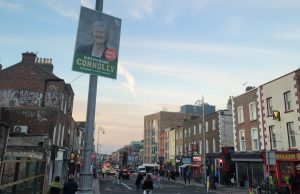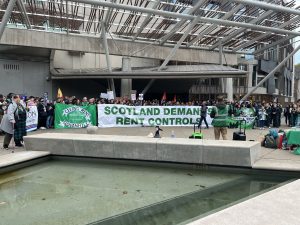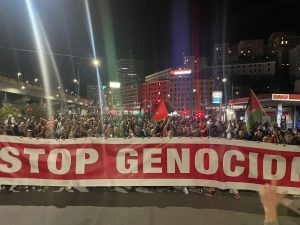
The battle behind Unite’s belated action on Palestine
Raymond Morell •Union members have won a long internal struggle for meaningful action against Britain’s arm sales to Israel. Raymond Morell was one of them – and reports from behind the scenes
While polling shows overwhelming public support for a full embargo on Britain’s arms exports to Israel, British factories continue to produce parts for planes dropping bombs on Palestine. Many weapon-producing factory workers are Unite members. As recent events show, their opposition to the genocide is becoming more critical to embargo campaigns.
Throughout the genocide, activists across Unite have been challenging their union leadership to take action – and growing increasingly frustrated over its lack of effective solidarity with Palestine. At the July 2025 Unite Policy Conference, its Executive Council (EC) finally agreed to take a stand against the production of arms for Israel.
The victory was hard fought. In March 2024, Unite General Secretary Sharon Graham had instructed union staff not to support campaigns against arms factories. She wrote then that there was ‘no contradiction for a trade union to hold a position of solidarity with Palestinian workers while at the same time refusing to support campaigns that target our members’ workplaces without their support’.
Graham’s letter continued: ‘The “first claim” on our priorities is always the protection and advancement of our members’ interests at work […] Unite cannot and never will advocate or support any course of action which is counter to that principle’.
Étáin, a young Irish delegate to the Scottish Executive Council (which sits below the EC in Unite’s structure) summed up a widespread frustration caused by the leadership’s previous position. She remarked to me at the time: ‘You can drape yourself in a Palestinian flag, but what are you actually doing? What is the tangible impact of your actions?’
Union activists expected far more leadership action to oppose Britain’s complicity with the genocide. Over the past year, they report proposing numerous motions on Palestine at EC meetings only for the chair to rule them out of order. The Policy Conference presented a new opportunity to challenge leadership inaction.
Diversity of tactics
At the Conference, members from across various regions and sectors responsible for building and transporting military equipment – including Aerospace and Shipbuilding, Docks, Rail, Ferries and Waterways – presented motions for solidarity action. Members in hospitality sectors and the Young Members Committee – whose members tend to work in services, bars and theatres, where Boycott, Divestment, Sanctions (BDS) is a growing unofficial campaign – were also central to opposing the union leadership position.
Overall, 17 different Unite bodies submitted motions during the Conference – making it obvious to the leadership that their passive position would be defeated if a vote was taken. As well as campaigning for an arms embargo, members were also determined to support the Palestine Solidarity Campaign (PSC) and to re-enact the union’s dormant BDS policy. While BDS policy had been previously implemented successfully at Veolia, Sainsbury’s, Hewlett Packard and others, official BDS campaigns had stopped under the current Unite leadership.
One tactic the EC can use in order to avoid open policy debates on potentially ‘controversial’ motions is making an ‘Executive Statement’: by accepting a tabled statement, related motions fall off the agenda. While many activists have grown to oppose this bureaucratic maneuver in general, the Executive Statement on Palestine moved by Megan de Meo was unexpectedly positive – and combined most of the key points from the 17 tabled motions.
Following an impassioned, lively debate, the statement was overwhelmingly passed by conference delegates. Its key points include commitments to:
- Respond to the call from Palestinian trade unions in supporting Unite members that refuse to build, handle or transport weapons destined for Israel
- Making a public statement in support of a full arms embargo against Israel
- Ban trade with illegal Israeli settlements and all other trade that aids or assists Israel’s violations of international law
- Call for effective sanctions to be placed on the Israeli economy including the seizure of Israeli state assets held in Britian
- Encourage Unite branches to affiliate to PSC and to support and publicise PSC demonstrations – including by sending Unite speakers to actions.
The statement states that: ‘Unite will support worker-led campaigns to boycott the handling of Israeli goods and services in their workplaces and campaigns for divestment from Israeli companies in their workplaces and the wider economy’. It also emphases the need for prior engagement with affected workers to avoid job losses while also committing to support members looking to ensure their work does not breach international law – a clause that offers encouragement to workers who refuse to build, handle or transport weapons destined for Israel.
Unfortunately, an emergency motion to support opposition to the proscription of Palestine Action (PA), in defence of peaceful protest, was ruled out of order by the Standing Orders Committee, after it was claimed – falsely, in my opinion – that debating the motion at conference would endorse the actions of PA.
The continuing fight
Twenty months of Unite inaction would have left the Israeli Embassy feeling very comfortable. Now, finally, members’ powerful voices have broken through union bureaucracy paralysis. The combination of a poor response to the genocide and a growing sense that Unite should be actively involved in opposing the slaughter of Palestinians has forced the leadership to change.
The day after the conference closed, Graham spoke at the Durham Miners Gala stating: ‘Any Unite member who wants to take action or refuses to handle goods destined for Israel will have our support. Unite will support you’.
The Policy Conference and Statement has been a game changer, paving the way for wider solidarity across the union. Our job now is to hold the leadership accountable to their commitments – including to speak at major PSC demonstrations – and hold education sessions for members to plan how to build solidarity with Palestine and to isolate the Israeli apartheid regime.
Nick, a young delegate from Hospitality in Glasgow captured the mood of activists, telling me:
‘The lay-membership [has] achieved a drastically improved, albeit imperfect, position on Palestine. Central to this is the commitment to fully support members who take action in the workplace in support of Palestinian liberation and an end to the genocide. This renewed policy provides activists with a launchpad from which to organise our respective workplaces to take collective action around this issue. Pro-Palestine members of Unite must develop BDS committees in their workplaces and localities to effectively plan this action’.
Delegates in Scotland have quickly organised in this vein, by coordinating BDS campaigns across local authorities, hospitality and aerospace. Following Conference – now with resources to allow it to meet and organise – the Scottish Executive Council will set up a Palestine Solidarity Committee and coordinate opposition to the genocide in Scotland. The next step is to extend such work across every Unite region, sector and branch.
This article was first published in Red Pepper.













0 comments